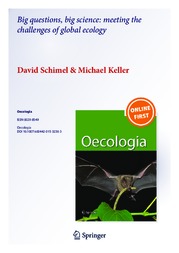Big questions, big science: meeting the challenges of global ecology.
Big questions, big science: meeting the challenges of global ecology.
Author(s): SCHIMEL, D.; KELLER, M.
Summary: Ecologists are increasingly tackling questions that require significant infrastucture, large experiments, networks of observations, and complex data and computation. Key hypotheses in ecology increasingly require more investment, and larger data sets to be tested than can be collected by a single investigator?s or s group of investigator?s labs, sustained for longer than a typical grant. Large-scale projects are expensive, so their scientific return on the investment has to justify the opportunity cost-the science foregone because resources were expended on a large project rather than supporting a number of individual projects. In addition, their management must be accountable and efficient in the use of significant resources, requiring the use of formal systems engineering and project management to mitigate risk of failure. Mapping the scientific method into formal project management requires both scientists able to work in the context, and a project implementation team sensitive to the unique requirements of ecology. Sponsoring agencies, under pressure from external and internal forces, experience many pressures that push them towards counterproductive project management but a scientific community aware and experienced in large project science can mitigate these tendencies. For big ecology to result in great science, ecologists must become informed, aware and engaged in the advocacy and governance of large ecological projects.
Publication year: 2015
Types of publication: Journal article
Unit: Embrapa Territorial
Observation
Some of Embrapa's publications are published as ePub files. To read them, use or download one of the following free software options to your computer or mobile device. Android: Google Play Books; IOS: iBooks; Windows and Linux: Calibre.
Access other publications
Access the Agricultural Research Database (BDPA) to consult Embrapa's full library collection and records.
Visit Embrapa Bookstore to purchase books and other publications sold by Embrapa.

